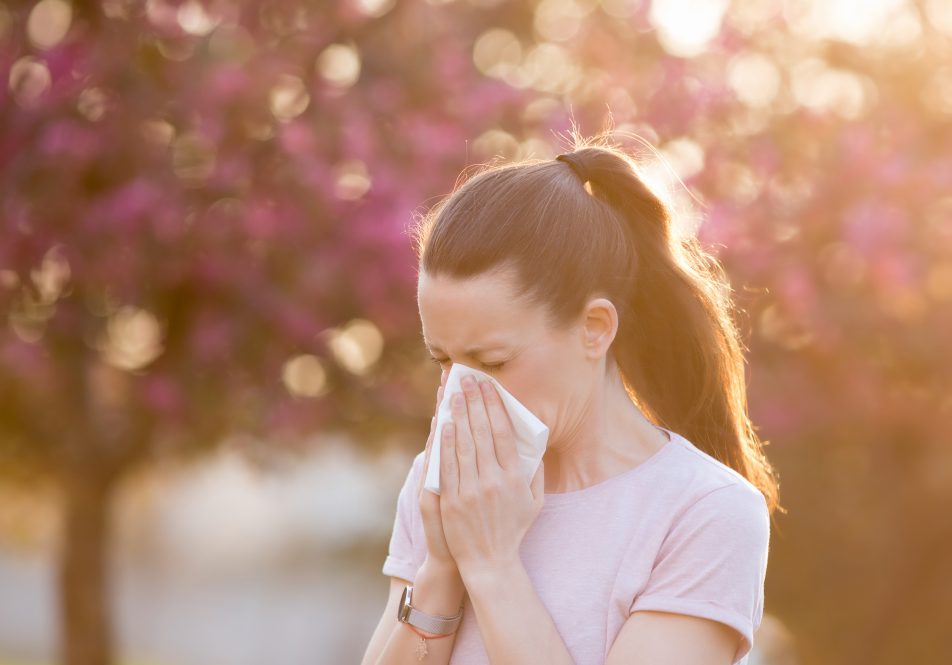Spring and sunshine have finally arrived, bringing with it sneezes.
“Some people have spring allergies, which means they can sneeze when they breathe in certain allergens through their nose like pollen from trees,” says Dr. Todd Falcone, an ENT and allergy expert at UConn Health.
But interestingly others may sneeze when they literally step outside into the sunshine says Falcone.
“It even happens to me. I am a ‘light’ sneezer,” says Falcone. “It is actually quite common. In fact, research shows about one in every three people sneezes when they are exposed to the sun or a bright light. And being a light sneezer is an inherited trait meaning you are from a family of light sneezers.”
Did you ever wonder why you sneeze — and what a sneeze actually is?
Most of the time we sneeze because something irritates the inside of our nose. The nose gets tickled and then sends a signal to our brain that then sends a signal back to the nose telling it to get rid of the offending substance. Sneezing, which is actually a very complicated process, involves a lot of muscles including those in your abdomen, chest, voice box, nose, throat and eyes says Falcone who confirms that your eyes always do indeed close when you sneeze due to its high force.
“When you sneeze, particles fly out of your nose and mouth at incredible speeds close to 100 miles per hour,” says Falcone and these particles that come out of your nose when you sneeze can travel about 20 feet.
“This is why it is so important, whether in the age of COVID-19 or any time, to cover your mouth and nose when you sneeze so your germ particles don’t travel to anyone else or nearby surfaces,” he stresses.
According to Falcone, other common triggers of sneezes include dust, hair and skin from your pet cat or dog, or even breathed in irritants such as pepper. Plus, when you catch an upper respiratory infection like the common cold virus in your nose, it causes lots of irritation, which causes you to sneeze too.
Common spring allergy symptoms include sneezing, nasal congestion, and an itchy, runny nose, as well as itchy, watery eyes. And allergy symptoms may last several months if not treated.
As the spring weather heats up and tree and pollen counts heighten noticeable spring allergies may peak in the coming weeks for those who suffer from them says Falcone, and grass allergies will worsen in the summer.

Dr. Todd Falcone’s 5 tips for spring allergy sufferers:
- Try to avoid or limit your exposure to your allergy triggers. While pollen counts are highest during the mid-day hours on warm, breezy days the patients with allergies to pollen and trees should spend their time more inside than outside if possible. Try to identify times of year or certain environmental exposures that trigger your symptoms, and employ avoidance measures. If this is not effective then you may benefit from allergy medications, but speak with your physician first.
- You can check the pollen counts in your area daily by typing in your zip code on sites like pollen.com.
- Changing your clothes and taking off your shoes when you get home and showering before bed are also helpful to remove any pollen from your body.
- Flushing your nose out with saline either from a pre-filled nasal saline bottle available at any drug store or from a Neti Pot can also rid your nose of the inhaled allergens that are triggering the allergic response.
- In terms of medicines, the first line therapies are oral antihistamines like zyrtec, claritin, or allegra, as well as a topical nasal steroid spray like flonase, nasonex, and rhinocort. These are safe medicines to use on a daily basis when one suffers from allergies. When these medicines no longer work, patients typically look for a longer term but more definitive solution, such as allergy immunotherapy, also known as allergy shots. Patients whose symptoms do not respond to these allergy medicines should be further evaluated by a physician to assess for factors that may make their symptoms worse.
Learn more about ENT/Otolaryngology care at UConn Health.



